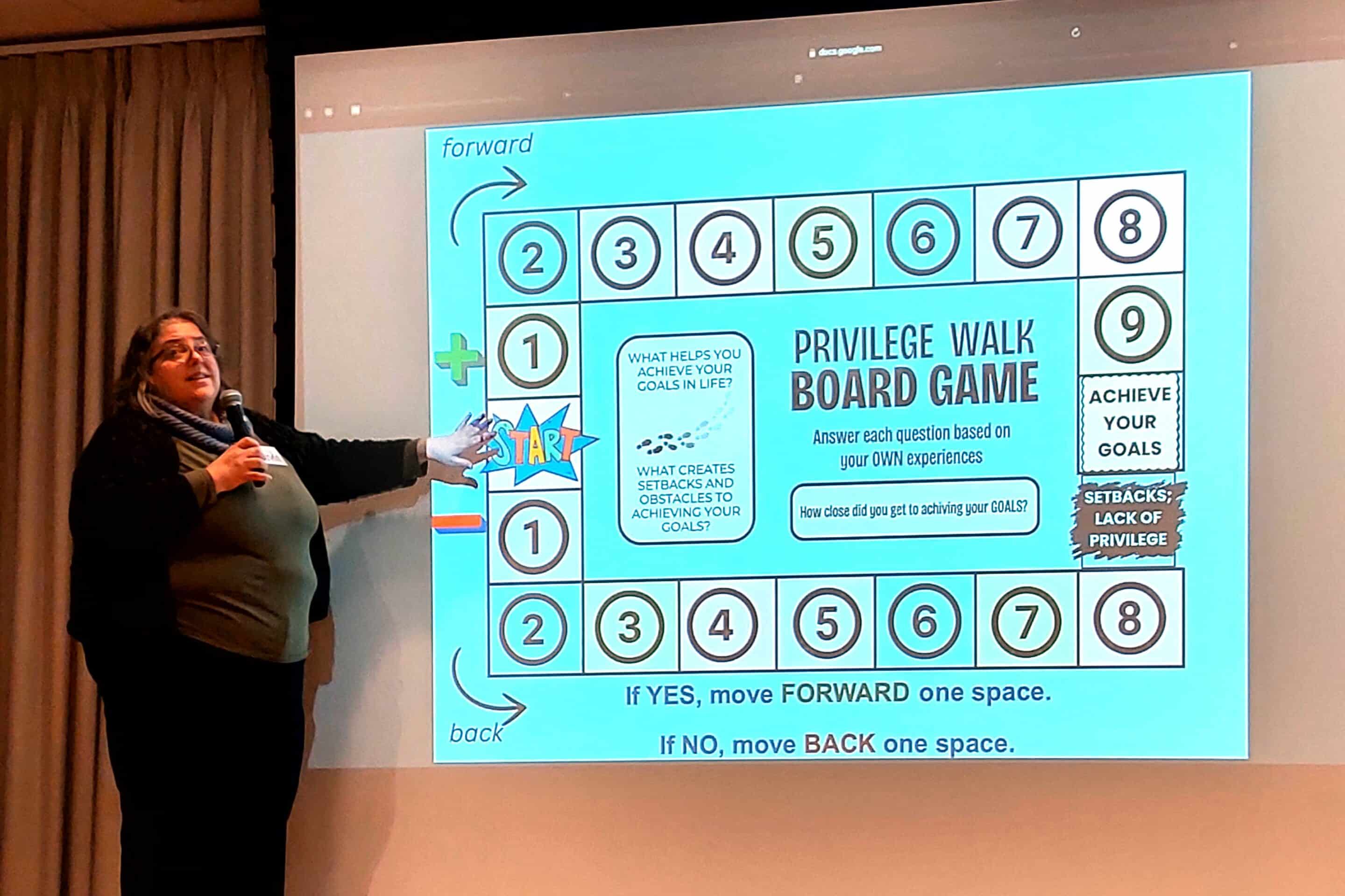Linda Preston leads an exercise where people explore the privilege that exists in their lives.
Reminder Publishing photo by Sarah Heinonen
LONGMEADOW — Longmeadow’s Diversity, Equity and Inclusion Advisory Committee hosted the first of six events planned for 2025 that will examine topics and issues including race, ability, gender and other underrepresented identities and communities.
As this was the first such event, the focus was “Embracing Differences.”
“When we embrace our differences, we create a rich tapestry of culture,” said Mary Beth Bergeron, president of the Longmeadow Adult Community Center Fund, which sponsored the event at the Adult Center.
The DEI Advisory Committee members took a moment to introduce themselves and talk about what brought them to volunteer for the committee. Chair Tammye Erb explained that she was autistic and the parent of a trans person. She pointed out that neither of those points are obvious from looking at her. Linda Preston said her son is African American and she is often asked if he is adopted. Saul Finestone, who had always considered himself a liberal Democrat, realized when George Floyd was murdered by a Minneapolis police officer in 2020, that not being racist “isn’t enough” and he became an avowed anti-racist.
Chile Salazar, the only person of color on the committee, said she has been a CEO and was still asked by white men if she was lost when she walked into a meeting. Edward Del Gaizo grew up in an integrated Bronx neighborhood and did realize until later in life that there was racism. Similarly, Ronnie Leavitt did not understand the extent of antisemitism in the world until she traveled abroad. Christopher Morris, the committee’s newest member, said he joined to learn more about his neighbors and make change in the community.
Erb said that, while it may seem odd that the town’s DEI Committee is all white, except for Salazar, “We showed up,” when the call was put out. She urged others to join them.
The roughly 40 people who attended the event sat around tables and participated in group activities. The first one sought to connect people through shared experiences and interesting stories. People answered questions about whether they had lived overseas, eaten frogs’ legs or snails, spoke more than two languages, volunteered recently, had an unusual pet or seen a polar bear or kangaroo in the wild. They were encouraged to share their answers and tell stories.
Del Gaizo said common experiences like these can “break the ice.” He said that, with this in mind, people can strike up a conversation with anyone.
Preston led a “privilege walk board game” exercise. Usually, a privilege walk involves everyone in a room standing in a line and either taking a step forward or back depending on whether they answer yes or no to a question. With so many people in the room, the board game version was chosen. Participants were asked to move forward or back along a track. The 12 questions included whether they “almost always see people like [themselves]” in media, spent time in a foster home or homeless or are sure a traffic stop has nothing to do with their race or ethnicity. Some of the questions related to race or sexual orientation, while others asked about being diagnosed with a disability or mental illness or growing up in a low-income family.
After the exercise, Preston asked those in the room to consider whether their result was surprising or if they had an “aha moment.”
“Wherever you ended up, it has nothing to do with anything you did,” Erb said. “Celebrate [differences]. Embrace them. And to do that, you have to see them.”
The idea for the DEI events was born out of Conversations with Saul and Ryan, a series of talks hosted by Finestone and Ryan McCollum.
Finestone, a 90-year-old white man and McCollum, a young person of color, were both members of the ad hoc Longmeadow Antiracism Coalition and the town’s Racial Justice Task Force. The two eventually handed over the reins to the DEI Advisory Committee.
After the meeting, Susan Malins reflected on the event. “I thought it was a good start and there was good turnout,” she said. “I hope that we take action.” To her, that meant not simply talking about issues. Cynthia Brown shared a similar sentiment, “I thought it was a great meeting and I to continue to engage.” Brown is a member of the Social Justice Committee at First Church of Christ Longmeadow.
Another member of First Church, Mary Friedman, looked around and said that she knew many of the people at the event. “There’s all these groups that we’re all a part of. It’s a lot of the same activists,” she said. “It’s just that we need to combine our efforts.” Jose “JJ” Rodriguez agreed. He said, “Our efforts, as wonderful as they are, would be so much better if we coalesced.”
The next DEI Advisory Committee event will take place in March.


